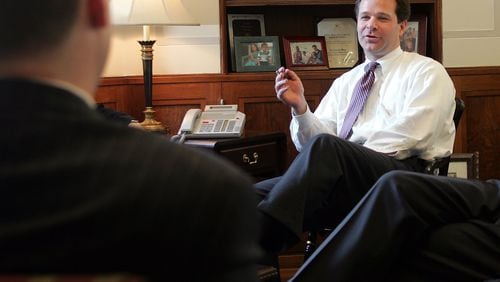A former Atlanta federal prosecutor — who was also a top Justice Department official before going into private practice law — is one of two additional candidates to replace ousted former FBI director James Comey.
On Tuesday, Chris Wray, a litigation partner with King & Spalding who has served as New Jersey Gov. Chris Christie’s personal attorney, was slated to meet with President Donald Trump. The second candidate for FBI chief, John Pistole, is a veteran of the Bureau, a former Transportation Security Administration director and current president of Anderson University in Indiana.
“(Wray) has an absolute reputation for integrity. I think he’s a great candidate,” said Kent Alexander, a former U.S. Attorney for the Northern District of Georgia who hired Wray 20 years ago.
White House spokesman Sean Spicer declined to provide a short list to replace Comey, who was fired in early May as the FBI investigated ties between the Trump campaign and Russia. Spicer told reporters that when Trump “feels as though he’s met with the right candidate he’ll let us know.” He said the president would continue to meet with candidates “until he finds the right leader.”
Though Wray is now in private practice, he spent about a decade as a federal prosecutor — including four years in the U.S. Attorney’s office based in Atlanta — before moving to the DOJ in 2001, where he was part of the response to the 9/11 attacks and the subsequent legal and operational oversight of the U.S. war on terrorism.
That was when Joe Whitley, another former federal prosecutor in Atlanta, met Wray. In 2002, Whitley was special counsel to the then-new Department of Homeland Security, and Wray was assigned to the 9/11 investigation.
“Chris is a very capable, a very smart attorney,” Whitley said.
Trump previously interviewed multiple individuals to head the FBI. The leading candidate at one point, former U.S. Sen. Joe Lieberman, withdrew his name from consideration earlier this month and that is when Wray and Pistole were added to the mix. The president has said he will announce his choice soon.
Several others who interviewed for the top FBI job have also withdrawn from consideration, including Sen. John Cornyn of Texas, former U.S. Attorney Michael Garcia and Alice Fisher, the former head of the department’s criminal division.
One of the two latest candidates, Pistole spent more than two decades with the FBI, serving as deputy director for six years before President Barack Obama picked him to lead the TSA in 2010. He oversaw the transportation agency during a turbulent stretch as it sought to balance passenger privacy with safety.
Wray’s professional background is like the histories of previous FBI directors, Whitley said.
William Webster, for example, had been a federal prosecutor in Missouri and then a federal judge when he resigned from the Eighth U.S. Circuit Court of Appeals in 1978 when President Jimmy Carter named him the FBI’s third director. Whitley noted that all the FBI directors who followed also had spent time as a federal prosecutor or on the federal bench.
Wray has similar experience, which equips him for the position, Whitley said.
“Chris understands the culture and what the apparatus requires in terms of leadership,” Whitley said. “This is going to be a different time at the bureau, and it’s going to be more of a challenge. It’s going to require a lot of staying power, and he has it.”
Wray, a 1992 graduate of Yale University Law School, was a law clerk for a judge on the Fourth U.S. Circuit Court of Appeals. In 1997, he became a federal prosecutor in Atlanta before joining the DOJ.
In 2003, the U.S. Senate unanimously confirmed him as assistant attorney general over the DOJ’s criminal division, which at that time was focusing on corporate fraud such as the investigation into the accounting practices at Enron Corp., a Houston-based energy and commodities company.
Wray returned to Atlanta in 2005 to take a job with private firm King & Spalding. As a litigation partner in the firm’s Washington and Atlanta offices, he represented New Jersey Gov. Chris Christie during the investigation into the George Washington Bridge lane-closing case. Two Christie aides were eventually convicted of plotting to close lanes of the bridge to punish a Democratic mayor who wouldn’t endorse the governor. Christie, who has informally advised the president, was not charged in the case.
Wray also led internal investigations by major health care, energy and telecommunications corporations that were at the time subject to federal regulatory or criminal probes.
“He provides a quiet leadership,” Whitley said, adding that Wray would be able to maintain the independence of the FBI even in a highly-politicized climate.
— The Associated Press contributed to this report.
About the Author






